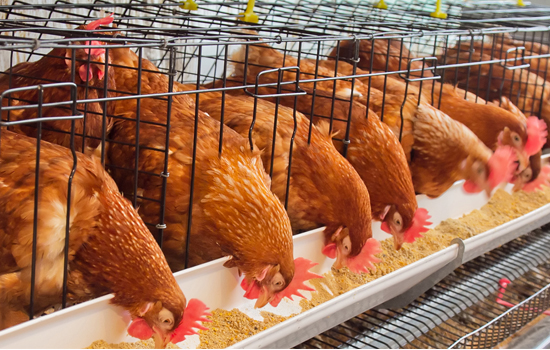The importance of temperature in broilers on chicken farms
- font size decrease font size increase font size
The temperature varies from season to season, and the impact of different seasons on feeding management is also great. Especially when changing seasons, the difference in temperature has a great impact on the growth and development of broilers. It is also different. Therefore, farmers should look after the chickens in the poultry cage equipment.
The effect of high temperature on the growth of broilers. High temperatures have an effect on the broiler's breathing and body temperature. Because broilers do not have sweat glands, in order to maintain the balance of heat in the body, broilers only increase the respiratory rate to increase their heat dissipation. Increasing heat by breathing has its own drawbacks. As the respiratory rate increases, a large amount of carbon dioxide is excreted, and the acidity and alkalinity in the broiler cannot be balanced to cause alkali poisoning. When the temperature is too high, it will directly cause damage to the respiratory tract of the broiler and affect normal life activities. High temperatures can affect the activity of enzymes in broilers, especially digestive enzymes. Digestive enzymes play a pivotal role in the digestive system of broilers. When the temperature is too high, the digestive enzymes are destroyed, and the destruction of the enzyme is irreversible, and once the enzyme is destroyed, it cannot be repaired. High temperatures also affect the quality of broilers. When the temperature is too high, the rate of protein denaturation in the body after slaughter is abnormal, which directly leads to changes in the color of the flesh and a decrease in the moisture content in the body.

The effect of suitable temperature on the growth of broilers. At the appropriate temperature, the broiler's life activities are normal, the broiler's breathing rate and body temperature are normal, the body's pH is balanced, and the enzyme activity in the broiler remains in a more active state, including digestive enzymes. Therefore, the digestive function of broilers is good, and the quality of broilers grown at a suitable temperature is good.
The effect of low temperature on the growth of broilers. The broiler's food intake increases under low temperature conditions, the demand for feed increases, the activity time decreases, and unnecessary calorie consumption is avoided. Cold stress can also occur when the temperature suddenly drops, causing respiratory illness in the broiler flock. A decrease in temperature can result in a decrease in the resistance of broilers to disease and is not conducive to management. In order to maintain a certain temperature in the house when the temperature is low, the ventilation will be reduced. At this time, it is easy to breed germs and pose a potential threat to the healthy growth of the broiler.
Whether the brooding temperature is suitable or not depends mainly on the behavior of the flock. It cannot be measured by temperature alone. It is mainly adjusted according to the behavior of the chicken in the cage to ensure the temperature of the chick in poultry farming cage.

